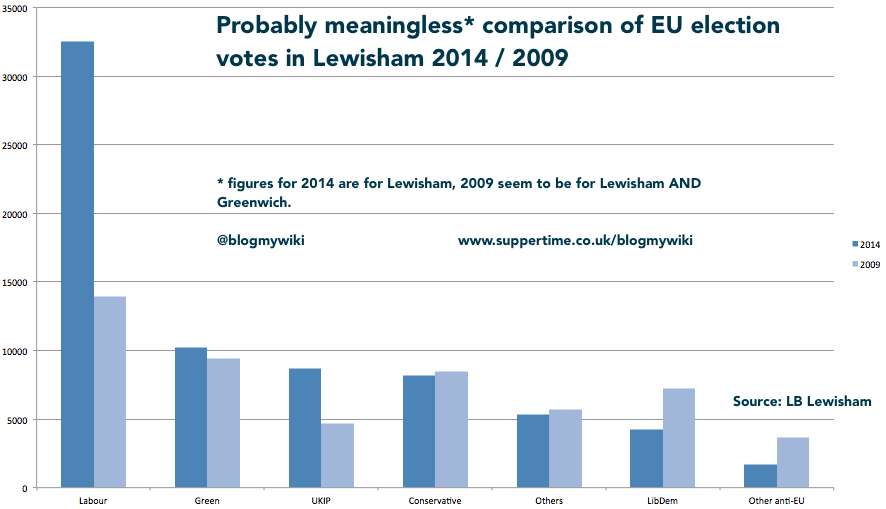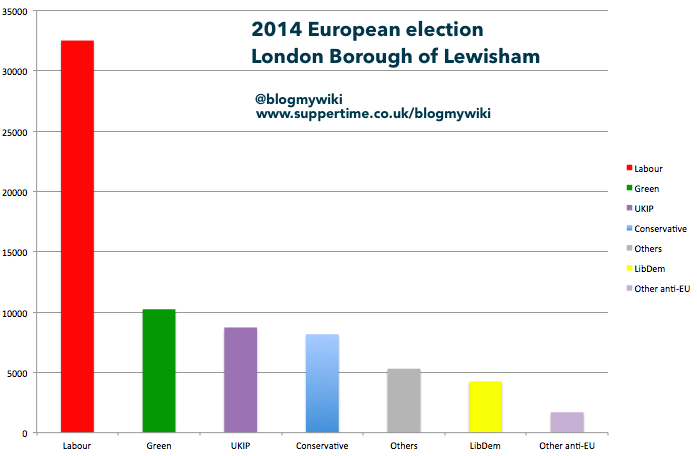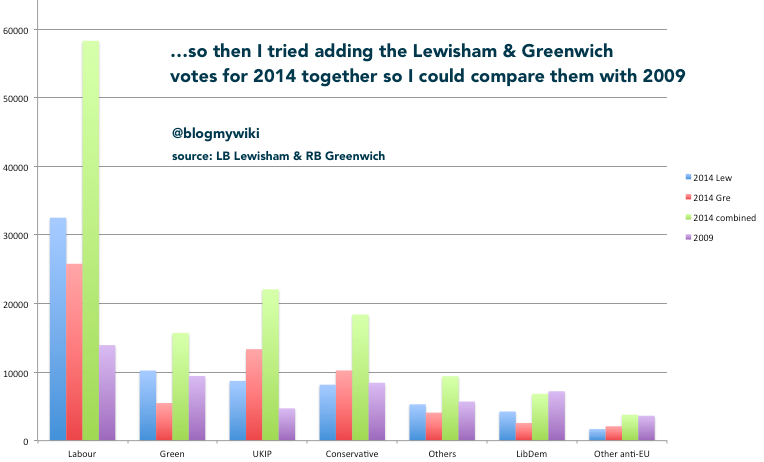A few bleary-eyed thoughts on the European elections…
The Greens
The Greens did astonishingly well in Lewisham, coming second. They got 10228 votes to Labour’s 32507. UKIP, however, actually did quite well on 8720 votes, beating the Conservatives into 4th place on 8161. Labour won all but one council seat in Lewisham last Thursday – if we had proportional representation for council elections, might we have UKIP councilors even in Lewisham?
Nationally, things aren’t so rosy for the Greens – they have 3 MEPs, but it seems that in London and the South West of England they may owe those seats to the UKIP vote being split by the alphabetically cheeky ‘An Independence from Europe’ party being listed first on the ballot paper. In the South West ‘An Independence from Europe’ got 23,169 votes, coming a distant 6th behind the LibDems, and in London they got 26,675 votes.
If UKIP had picked up "An Independence From Europe"s 23,000 votes in the South West, they'd have taken the 6th seat, not greens.
— James Ball (@jamesrbuk) May 25, 2014
Indeed, I’ve made a bar chart for the Lewisham result, grouping the ‘other’ votes into anti-EU others, and ‘other’ others – either pro or neutral on Europe. I make the anti-EU others (including the BNP) add up to 1691 votes, and if you add that to UKIP, you get 10411 votes, slightly ahead of the Greens on 10228. This bar chart also shows the LibDems getting fewer votes than the ‘others’, whether you split them on EU lines or not.
Proportional Representation
I’ve never been a big fan of PR*, and last night has done nothing to change my view. For years the Liberal Party, the SDP and the LibDems have blamed lack of PR for their lack of representation in Parliament. Well, the European Parliament is elected by PR, and the LibDems were all but wiped out. Where are the people who say ‘first past the post’ is undemocratic this morning? Oddly quiet. If we had PR in Westminster and local council elections, UKIP would likely be the biggest party in the House of Commons, and Nigel Farage would stand a good chance of becoming Prime Minister. I’d like to hear someone ask Nick Clegg about what he thinks about PR now.
*I mainly dislike PR because it usually reduces geographical accountability. I think that’s why so few people know, or care, who their MEP is. Does a person seem like ‘my’ MEP if they represent an opinion I’m vaguely sympathetic with across a huge geographical area? If each area, South East London for example, had its own MEP, I think people would feel more connected with the European Parliament, and that would be good for democracy.
Two Nations
(Or possibly three, if Scotland becomes independent – see below.) There’s That London. And everywhere else. As Nick Robinson pointed out this morning on Radio 4, this poses a huge problem for Labour. London Labour MPs are saying they should stand up to Farage, challenge his Little Englander views. That’s fine in London, where Labour are now very strong and UKIP relatively weak, but Labour MPs from elsewhere (the North East and North West) are singing a different song. Londoners may say they are pandering to racism, but those MPs have presumably knocked on more doors in their constituencies than I have, and I can only assume what they hear on the doorstep mirrors what happened at the ballot box. For example, in the North East (Labour heartland, surely?) UKIP came a close second, 177,660 votes to Labour’s 221,988.
Can’t believe UKIP are doing so well despite all of those anti-UKIP tweets we metropolitan liberals sent to each other.
— James O'Malley (@Psythor) May 25, 2014
Labour may also be mindful of what just happened to a politician who had the courage of his convictions: Nick Clegg didn’t duck the issue of Europe, he fought a campaign based on what he passionately believed to be right when many other politicians kept quiet – and his party was annihilated at the polls.
The other problem for Labour is that amazingly few of UKIP’s votes came from the Conservatives. They can’t all have come from the BNP, so where did they come from? I suspect a lot came from people who would have voted Labour in different circumstances.
Scotland
Alex Salmond will paint the English as boggle-eyed and inward-looking (pot, kettle, anyone?). The likely election of a single UKIP MEP in Scotland is a midge in that ointment – how much of one, remains to be seen. I’m amazed that so little attention has been focused on the real earthquake to come: the effect that Scottish independence would have on English and Welsh politics. I don’t even want to think about it. And I’m pretty sure Ed Miliband doesn’t want to think about it either. Plus, of course, anyone living in England or Wales (Scottish, English or Welsh) doesn’t get a vote, despite the fact that the outcome affects England and Wales every bit as much as it affects Scotland.
Blame the Media
Well, that means: blame the BBC, never mind how much coverage Sky or ITV News have given UKIP – or, as a friend points out, how much coverage UKIP got on Twitter from people complaining about UKIP and/or the BBC.
Last week I predicted an avalanche of criticism for the BBC when UKIP did well. UKIP did well. People are blaming the BBC. But not quite as much as I expected. I’ve been heartened to see, at least among the people I follow, just as many people blaming Russell Brand for encouraging people not to vote. How’s that working out, Russell? Mmm? *Stewie Griffin voice*
Want to blame someone for UKIP’s airtime? How about Ofcom?
So, why did UKIP get so much election airtime? Because Ofcom ruled they should. http://t.co/j1QmE16Dva
— Brian Whelan (@brianwhelanhack) May 27, 2014
Update
I tried to compare the 2014 results with the last European elections in 2009, but I’m confused about the geographical areas for the count. The Lewisham council website’s figures for 2014 are for the London Borough of Lewisham, but 2009′s are for ‘Greenwich and Lewisham’ – so I assume this means the figures can’t be directly compared. I’d be grateful for advice on this. Oddly, if you do compare them, the numbers of votes cast for each party are only radically different for Labour.

So, if the count areas were different, and I can’t split the 2009 Greenwich numbers off from Lewisham, how about I combine the 2014 Lewisham and Greenwich votes to make a more meaningful comparison? Well, I tried that and the picture is no less confusing.
I thought turnout may be an issue: it was apparently 38.9% in Lewisham AND Greenwich in 2014 – though the fact that both boroughs report exactly the same figure makes me suspicious. In 2009 the turnout for both boroughs was 30.79% – lower, but was it low enough to account for the massive spike in Labour votes in 2014?
My conclusion: it’s amazing what I’ll do in order to avoid marking and planning. And I should stick to the day job.


